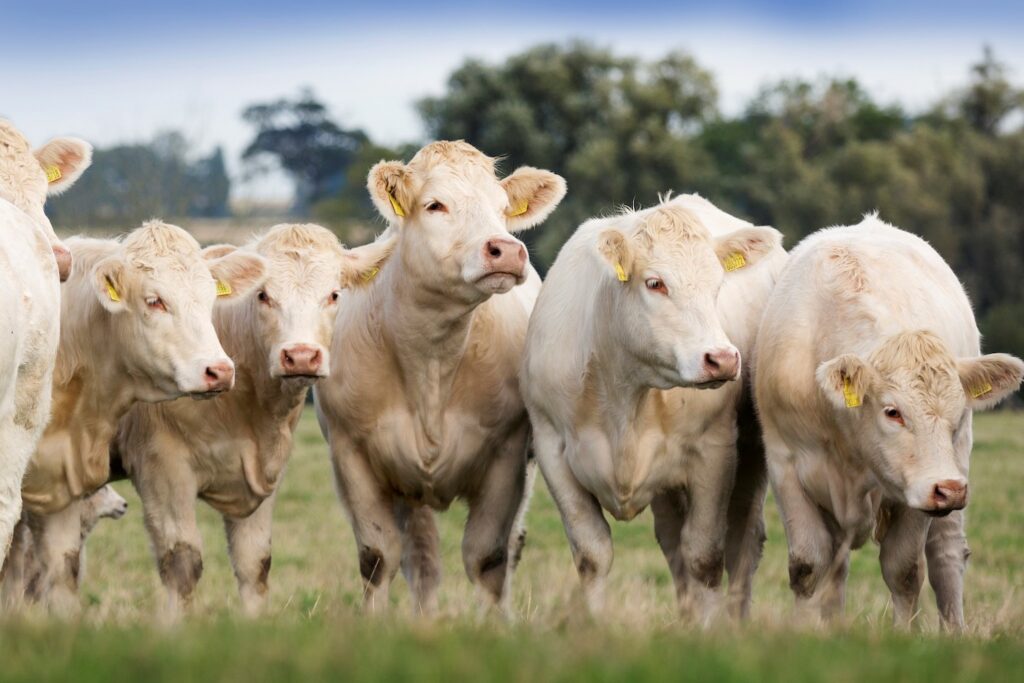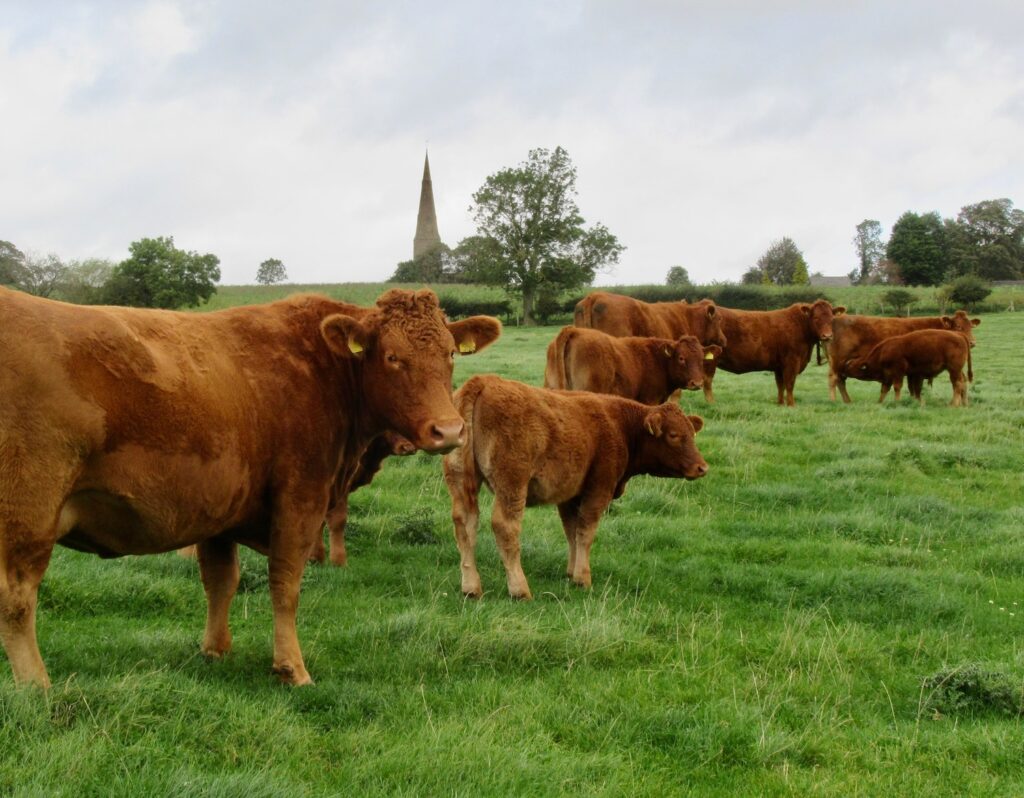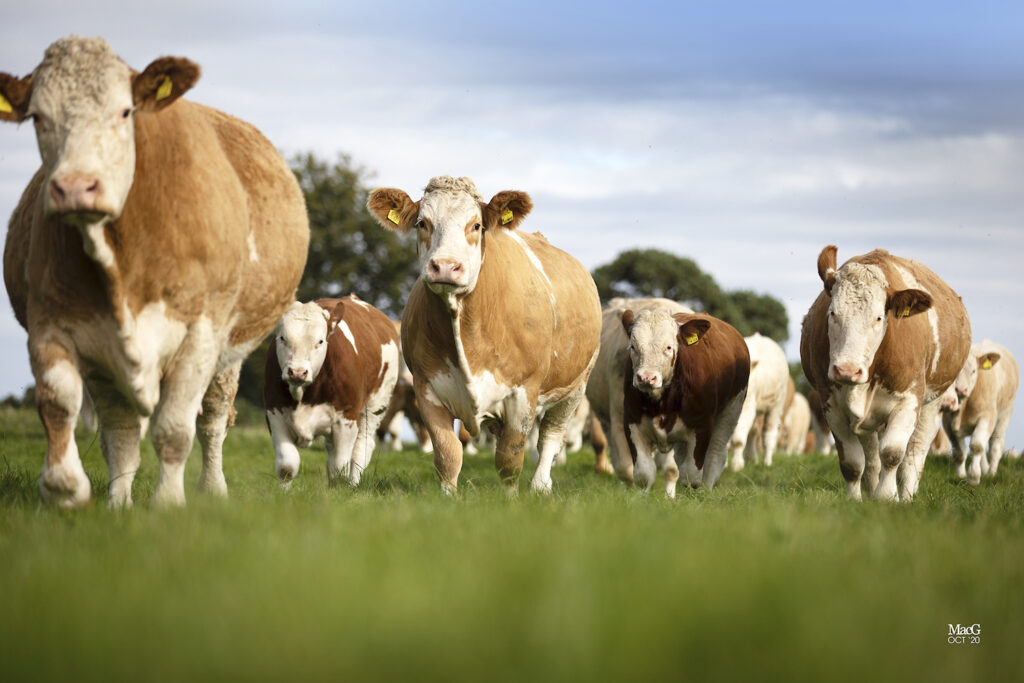Beef breeds: Three breeds that are seeing growing popularity
4th July 2022
In the first in our series of focuses on cattle and sheep breeds, Farmers Guide spoke to three beef breed societies about the special qualities that are contributing to their rising popularity.
Charolais celebrates 60th anniversary

© British Charolais Cattle Society.
Chairman of the British Charolais Cattle Society, Mr Allen Drysdale, says the breed has an “unrivalled” ability to convert forage and cereals into superior growth rate, while laying down both muscle and fat cover as well, without compromising on calving ease.
“With the ever-spiralling cost of the three Fs and farmers always asked to be more efficient, the quicker you can turn around stock and the less days it’s on farm, the more beneficial to the environment – but there is also a larger throughput of animals in a shorter period of time, making your farming enterprise as carbon friendly and efficient as possible.”
The breed continues to improve calving ease without compromising its main traits of growth, muscling and fleshing ability, Mr Drysdale adds.
The society is celebrating its 60th anniversary this year by holding the World Charolais Congress from the 7–18th of July and will be visiting some of the leading herds throughout the UK to showcase to the world.
“The breed has come a long way from the early days,” Mr Drysdale adds. “We are ever changing by listening to what the marketplace requires and striving to deliver that as best as we possibly can.
“I feel the breed is in a tremendous position at present. In the coming years, things will be very tough for farmers and I believe we at British Charolais have a viable sustainable animal that can fit into any farming system in any part of the country and give farmers the best possible return on their investment. The Charolais is here to protect the farmer, the plate and the planet.”
South Devon brings “efficiency and profitability”

South Devon Herd Book Society.
The South Devon breed continues to make significant inroads into the Midlands and other parts of the UK, with increased interest in this commercially productive native beef breed, according to the South Devon Herd Book Society. The South Devon’s excellent maternal qualities bring efficiency and profitability to cross-breeding as well as pure-bred herds.
The welcome increase in the number of native beef schemes being set up by processors and retailers offers choice and competition for cattle finishers; whilst also satisfying consumers who seek assurance of environmental sustainability and carbon reduction from grass-fed suckler herds. With a high return from the South Devon carcase in both weight and grade, the breed is well placed to maximise these opportunities.
Known for their very quiet temperament, the cattle are easy to handle. At the end of a cow’s productive life, sometimes over 15 years, the cull cow price brings the final reward to the producer with good weights and grading, as her beef progeny will have done during her lifetime.
South Devons are well suited, not just to beef farms who want to benefit from the breed’s characteristics, but also to arable businesses who wish to diversify and make use of the best fertiliser there is for carbon capture – manure!
South Devon cattle breeders are to be found throughout the Midlands and the East of England, and they welcome visitors by appointment. For further information about their location, and about the breed please contact: The breed secretary, SDHBS, EX5 1DJ, caroline@sdhbs.org.uk, 01392 447494.
Strong year for British Simmental

Image © British Simmental Cattle Society.
British Simmental has enjoyed a strong year of performance at the point of sale, both in commercial and pedigree rings, as demand has increased for the breed’s dual-purpose qualities, the British Simmental Cattle Society notes.
A series of record averages and clearances at pedigree sales, has been coupled with an increase in pedigree registrations and confirmation of Simmental as the UK’s number one continental breed for age at slaughter.
Future fit, Simmental genetics are gaining a commercial recognition from a profitability point of view and with strong ‘green’ credentials. Long regarded as maternal mainstays of the suckler herd, Simmentals are high quality suckler cows; full of milk; fertile; easy calving; can calve at two years old; and can wean calves at 50% of their bodyweight at 200 days.
AHDB’s confirmation of the breed’s age at slaughter abilities is coupled with Simmental sired progeny being fast growing with terrific weight for age, hitting industry specs and producing high quality carcases with a high retail beef yield, the society adds. These are the natural attributes and efficiencies of the modern British Simmental that are forging a profitable commercial future in an industry with a higher cost base, and meeting the challenges of reducing the carbon footprint of beef production.
Continuous breeding and improvement has given the modern Simmental a distinct British signature, with it being adaptable to all geographies and systems around the UK. It’s a no-nonsense beef breed that ‘gets the job done’, the society concludes.
